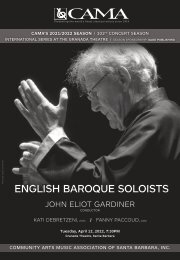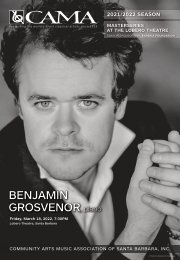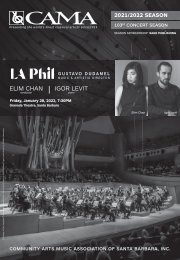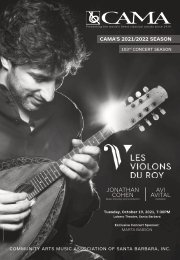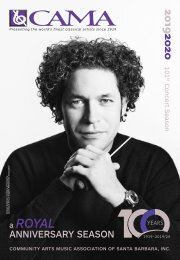Program Book | December 7, 2022 | CAMA presents Hélène Grimaud, piano | Masterseries at the Lobero Theatre, Santa Barbara
WEDNESDAY, DECEMBER 7, 2022, 7:30PM HÉLÈNE GRIMAUD, piano Direct from Carnegie Hall! French pianist Hélène Grimaud is a deeply passionate and committed musical artist with an original and probing mind who takes no note for granted. Her poetic expression and peerless technical control have drawn comparisons to Martha Argerich and Jorge Bolet. Her contribution to and impact on the world of classical music were recognized by the French government with admission to the Ordre National de la Légion d’Honneur (France’s highest decoration) at the rank of Chevalier (Knight). In her role as a passionate wildlife conservationist, Grimaud established the Wolf Conservation Center in upper New York State, which offers education about wolves, their relationship to the environment, and the human role in protecting their future. PROGRAM: VALENTIN SILVESTROV: Bagatelle I CLAUDE DEBUSSY: Arabesque No.1 VALENTIN SILVESTROV: Bagatelle II ERIK SATIE: Gnossienne No.4 FRÉDÉRIC CHOPIN: Nocturne No.19 in E Minor. Op.72, No.1 ERIK SATIE: Gnossienne No.1 ERIK SATIE: Six pièces froides IV—“Danses de travers No.1: En y regardant à deux fois” CLAUDE DEBUSSY: La plus que lente FRÉDÉRIC CHOPIN: Mazurka in A Minor, Op.17, No.4 FRÉDÉRIC CHOPIN: Waltz No.3 in A Minor, Op.34, No.2 CLAUDE DEBUSSY: “Clair de lune” from Suite bergamasque CLAUDE DEBUSSY: Rêverie ERIK SATIE: Six pièces froides V—“Danses de travers No.2: Passer” ROBERT SCHUMANN: Kreisleriana, Op.16 •
WEDNESDAY, DECEMBER 7, 2022, 7:30PM
HÉLÈNE GRIMAUD, piano
Direct from Carnegie Hall!
French pianist Hélène Grimaud is a deeply passionate and committed musical artist with an original and probing mind who takes no note for granted. Her poetic expression and peerless technical control have drawn comparisons to Martha Argerich and Jorge Bolet. Her contribution to and impact on the world of classical music were recognized by the French government with admission to the Ordre National de la Légion d’Honneur (France’s highest decoration) at the rank of Chevalier (Knight). In her role as a passionate wildlife conservationist, Grimaud established the Wolf Conservation Center in upper New York State, which offers education about wolves, their relationship to the environment, and the human role in protecting their future.
PROGRAM:
VALENTIN SILVESTROV: Bagatelle I
CLAUDE DEBUSSY: Arabesque No.1
VALENTIN SILVESTROV: Bagatelle II
ERIK SATIE: Gnossienne No.4
FRÉDÉRIC CHOPIN: Nocturne No.19 in E Minor. Op.72, No.1
ERIK SATIE: Gnossienne No.1
ERIK SATIE: Six pièces froides IV—“Danses de travers No.1: En y regardant à deux fois”
CLAUDE DEBUSSY: La plus que lente
FRÉDÉRIC CHOPIN: Mazurka in A Minor, Op.17, No.4
FRÉDÉRIC CHOPIN: Waltz No.3 in A Minor, Op.34, No.2
CLAUDE DEBUSSY: “Clair de lune” from Suite bergamasque
CLAUDE DEBUSSY: Rêverie
ERIK SATIE: Six pièces froides V—“Danses de travers No.2: Passer”
ROBERT SCHUMANN: Kreisleriana, Op.16
•
Create successful ePaper yourself
Turn your PDF publications into a flip-book with our unique Google optimized e-Paper software.
for <strong>the</strong> sentimental “slow waltz” in Paris,<br />
and might be taken to mean “<strong>the</strong> ultim<strong>at</strong>e<br />
slow waltz.” It does not mean th<strong>at</strong> <strong>the</strong><br />
piece is to be played particularly slowly.<br />
Debussy “recorded” it on a player piano roll<br />
in 1913, and—even allowing for some inaccuracy<br />
in <strong>the</strong> process—<strong>the</strong> performance is<br />
pretty sprightly.<br />
The ubiquitous « Clair de lune »<br />
(“Moonlight”) is from <strong>the</strong> Suite bergamasque,<br />
which Debussy began in 1890 and<br />
published only in 1905. It is not known how<br />
much he revised it over <strong>the</strong> years, but one<br />
clue is th<strong>at</strong> « Clair de lune » was originally<br />
titled « Promenade sentimentale ». The final<br />
version’s “Moonlight” title comes from<br />
an 1869 poem by Paul Verlaine, and <strong>the</strong> music<br />
seems to depict its third stanza:<br />
Rêverie is ano<strong>the</strong>r early work, d<strong>at</strong>ing<br />
from 1890. Debussy was not fond of it, considering<br />
it a sin of his youth when his publisher<br />
decided to print it years l<strong>at</strong>er. “I regret<br />
very much your decision to publish Rêverie.<br />
I wrote it in a hurry years ago, purely for m<strong>at</strong>erial<br />
consider<strong>at</strong>ions. It is a work of no consequence<br />
and I frankly consider it to be no<br />
good.” L<strong>at</strong>er gener<strong>at</strong>ions have disagreed.<br />
The four pieces by Erik S<strong>at</strong>ie on <strong>the</strong><br />
program d<strong>at</strong>e from <strong>the</strong> 1890s, when he was<br />
playing piano and conducting in small <strong>the</strong><strong>at</strong>rical<br />
establishments and, if his own st<strong>at</strong>ements<br />
are to be believed, avoiding creditors.<br />
He became friends with Debussy, who<br />
called him “a gentle medieval musician lost<br />
in this century.” Debussy l<strong>at</strong>er called him<br />
“<strong>the</strong> precursor,” a prescient recognition of<br />
how influential he would become. The two<br />
selected Gnossienes and two selections<br />
from Six pièces froides (Six Cold Pieces)<br />
Au calme clair de lune triste et beau,<br />
Qui fait rêver les oiseaux dans<br />
les arbres<br />
Et sangloter d’extase les jets d’eau…<br />
With <strong>the</strong> calm moonlight, sad<br />
and lovely<br />
Which makes <strong>the</strong> birds dream in<br />
<strong>the</strong> trees<br />
And <strong>the</strong> plumes of <strong>the</strong> fountains<br />
weep in ecstasy…<br />
Claude Debussy, 1902<br />
<strong>CAMA</strong> AT THE LOBERO THEATRE • HÉLÈNE GRIMAUD<br />
17









